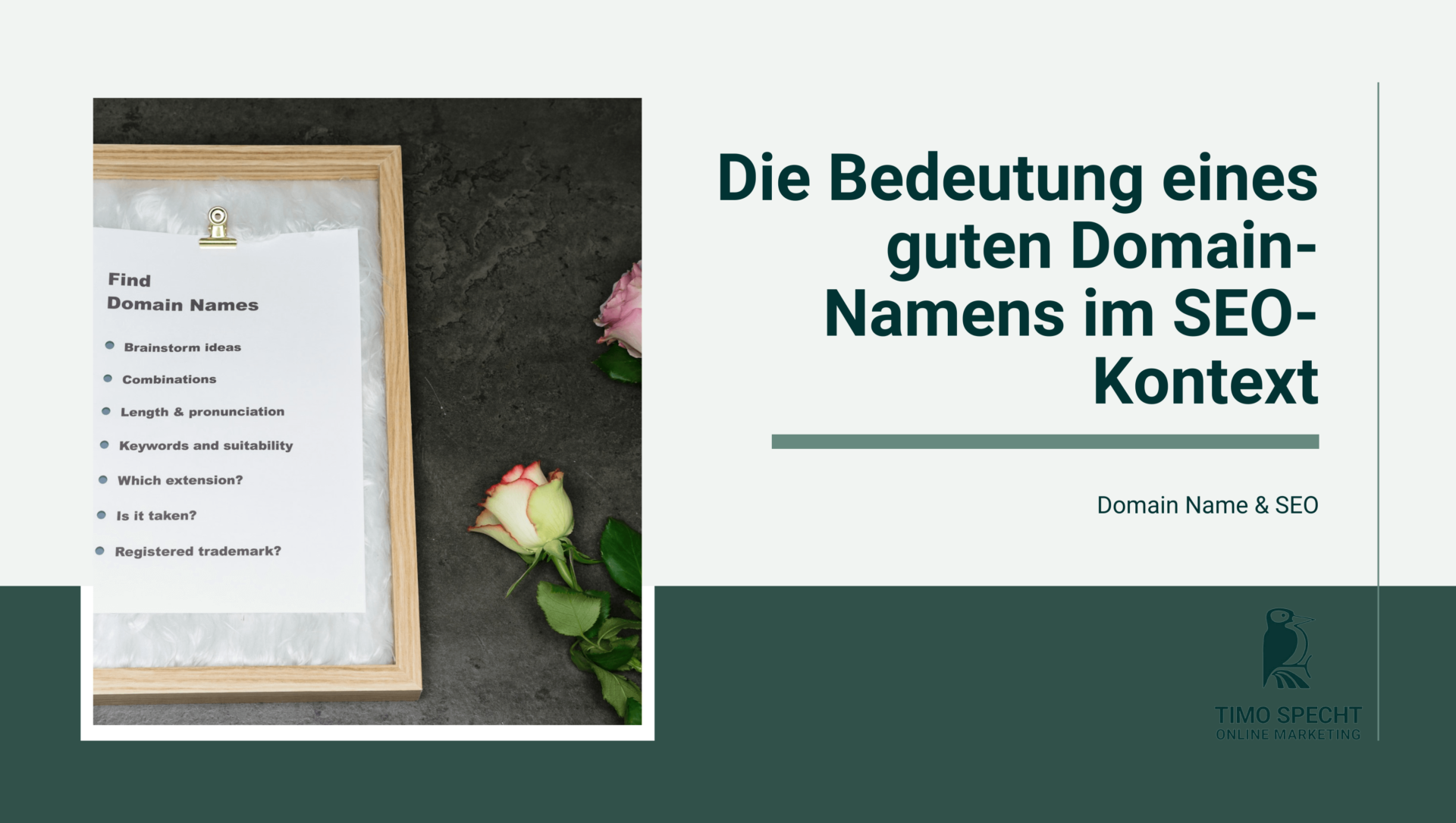Why the right domain name is essential for SEO
There are typically two things at the beginning of every web project: the actual idea and how it will be marketed later - which inevitably draws attention to the chosen domain. Of course, no sustainable SEO strategy stands solely on the symbolic feet of the domain, but as a supplementary ranking criterion it should definitely be taken into account - although other factors also play an important role.

Table of contents
Past and present: how the importance of the domain has changed over the years
Anyone who remembers the early years of the commercial internet, around the turn of the millennium, will be aware of the enormous importance of domains in the past: back then, SEO concepts were far less complex, at least compared to today's situation. It was not uncommon for many backlinks and a keyword-related domain to be enough to bring a website to the top positions, at least in less competitive sectors.
The Google algorithm now works in a much more complex way: of course, it still takes keywords into account in meta information, headings and, for example, the domain, but the integration of many other ranking factors has somewhat reduced the importance of these traditional ranking criteria. Nevertheless, the choice of domain naturally plays a role: firstly, it signals to the search engine algorithms a contextual reference to the content of the page via a relevant keyword, and secondly, it provides human users with a preview of what they can expect on the respective website.
For this reason, strong domains, those with crisp keywords that have a high search volume, are still highly traded within the domain trading scene today - and potentially generate not insignificant sums for their sellers. Buying free domains at Hosttech.de is an alternative for anyone looking for a free domain for their web project - especially for popular keywords, however, you sometimes have to switch to less well-known TLDs.
-
Free
SEO strategy meeting
In a free SEO strategy consultation, we uncover untapped potential and develop a strategy to make you more successful on Google.

- More organic visibility
- More organic visitors to your website
- More inquiries & sales
How does the domain specifically influence search engine optimization?
First of all, a distinction must be made between the two domain name options: Brand domains on the one hand and keyword domains on the other. Examples of brand domains are obvious: they use the company name or brand as the domain name, as is the case with "Apple.com", for example. A keyword domain, on the other hand, would be "www.iphone-kaufen.tld" - i.e. a specific term that indicates the services/products offered by the website and is also frequently searched for.
While large corporations, such as Apple, generally do without such keyword domains, they continue to play a major role outside of this. Webmasters must first pay attention to two points: Is the keyword set as the domain name actually searched for and does it actually fit the website? To stay with the example: The domain "iphone-kaufen.tld" naturally only makes sense if iPhones are also offered there - anything else would only lead to high bounce rates, which in turn would be very negative for the SEO effect achieved.
Tip: It pays to pay attention to details! Last year, Google's John Mueller explained in a mastodon how hyphens and underscores differ in the evaluation of a domain name - and stated that hyphens generally have a slightly better SEO effect. At the same time, Mueller also says in the very next sentence that the domain name will ultimately never make or break your rankings ("never going to make or break your SEO").
What should I look out for when choosing a domain name?
First of all, of course, you have to make sure that the domain is still freely available under the desired domain extension. If not, you only have three options: Try to buy the domain name from the current holder, switch to a different keyword or keep the keyword and choose a different domain extension instead. New domain extensions mean that there are many options in this respect. For example, the iPhone retailer mentioned in the example above could also use a domain extension such as ".store" or ".tech" if classic country TLDs such as ".de" or international ".com" are already occupied.
Furthermore, a domain should be short and snappy, both with regard to the human user and the search engine algorithm. A domain keyword such as "electricity comparison" is ultimately much easier to remember than, for example, "electricity provider-compare-here-free" - and the latter domain doesn't necessarily come across as serious. Ultimately, your website will not only receive traffic from organic searches, but ideally also from viral marketing, mentions on the internet or even through classic "word of mouth" - in all of these situations, an easy-to-remember, meaningful domain name is a real added value.
As a rough rule of thumb, up to 15 characters are acceptable for a domain name. But remember what Google's John Mueller said: Ultimately, the way search engine algorithms work today, the domain name will not determine success or failure. However, it is a good bonus that could - but does not have to - be the deciding factor for a better ranking, especially in competitive industries.
- I am one of the leading SEO experts in Germany
I am known from big media such as Stern, GoDaddy, Onpulson & breakfast television and have already worked with over 100+ well-known clients successful on Google.
Google rating
Based on 185 reviews
Trustpilot rating
Based on 100 reviews
The importance of domain age from an SEO perspective
The age of a domain can also influence the SEO ranking - but not in a vacuum. In this context, it is important that the domain has existed for a long time and that it has conveyed a high quality during its existence.
Another example: A 10-year-old domain that has been attached to a spam website and has a very poor backlink profile would not be a good domain per se. However, a 10-year-old domain that has many authority and trust links and has always impressed with high-quality, unique content would be rated better than the same domain without ten years of existence. The age of a domain can therefore have positive effects, as long as it goes hand in hand with quality.
Consider country-specific TLDs when making your choice
The domain extension is also taken into account by the Google algorithm. This makes sense, as it also communicates the website's target group. Hosting a German website on a ".co.uk" domain makes little sense for an obvious reason - because the domain extension is specifically aimed at Brits. Accordingly, the user would already have the wrong idea about the website if they reached it via such a country-specific domain and the content did not match the domain extension.
In general, German domain endings (.de) as well as international endings (e.g. .com or .net) can be said to have an advantage in the German Google search. But again, just because a German TLD has been matched with a relevant keyword does not automatically mean that the website will be ranked number 1 on Google.
- Do you know my SEO newsletter?
Register now and receive regular tips from the experts.
Die Domain muss immer Bestandteil eines ganzheitlichen, nachhaltigen und professionell umgesetzten SEO-Konzepts sein. Nur dann klappt es bei Google und Co. mit Spitzen-Rankings. Eine Keyword-Domain allein gewährleistet kein Erreichen der oberen Ränge, sie kann aber zum Vorteil avancieren und gegebenenfalls, zwischen zwei ebenbürtigen Seiten, den Ausschlag geben. Allen voran sollte bei der Domainwahl aber auch berücksichtigt werden, was die Zielgruppe möchte – und wie gut der gewählte Name bei der ankommt.

